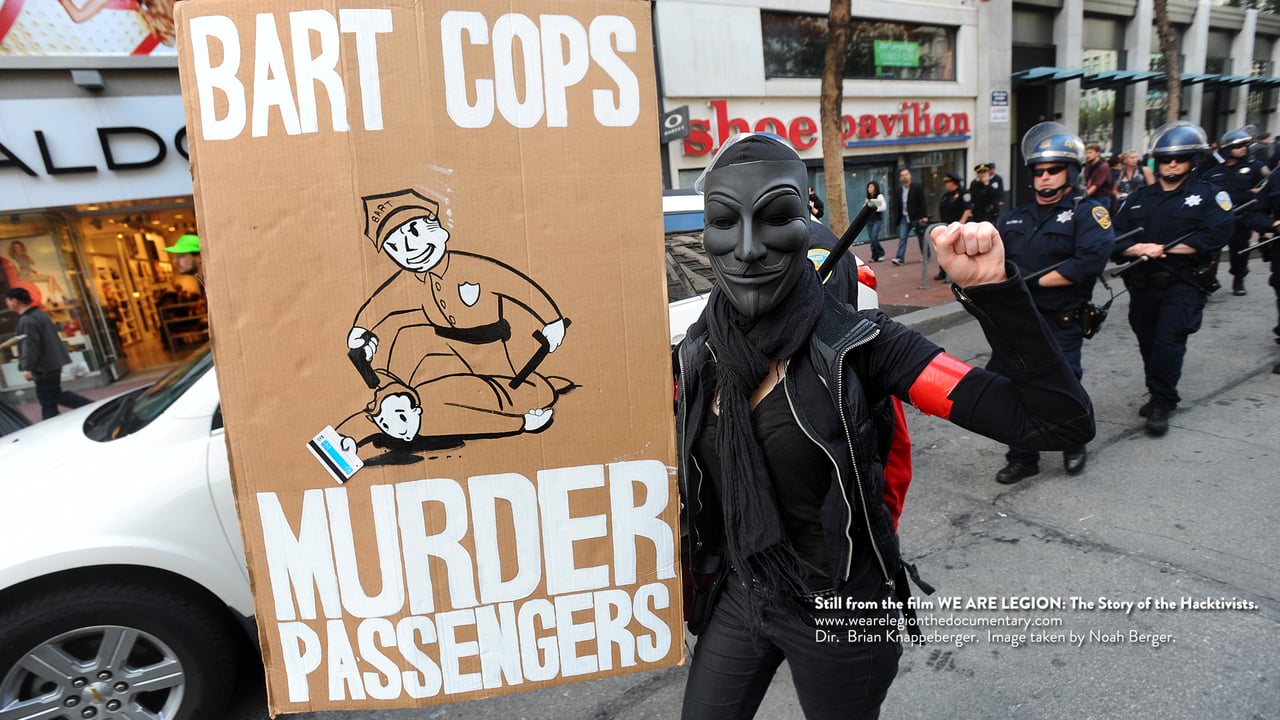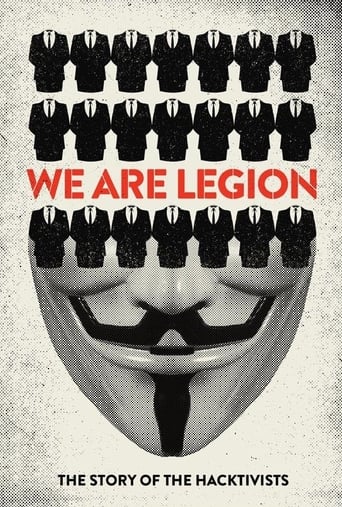SnoReptilePlenty
Memorable, crazy movie
Tayyab Torres
Strong acting helps the film overcome an uncertain premise and create characters that hold our attention absolutely.
Gary
The movie's not perfect, but it sticks the landing of its message. It was engaging - thrilling at times - and I personally thought it was a great time.
Darin
One of the film's great tricks is that, for a time, you think it will go down a rabbit hole of unrealistic glorification.
arsindermanege
The film was written and directed by Brian Knappenberger and features the story of Anonymous assumed to stem from the imageboard 4chan. It also outlines major turning points and "operations" in their history. Angered by many diverse issues such as copyright abuse, police brutality, online censorship and would-be web controllers this loosely affiliated collective of hacktivists have organised both online and offline protests, cyber attacks on foreign governments during the Arab Spring movement and provided technical support to the Occupy movement.
jcraig-817-581959
Let me say up front that I have serious reservations about hacking as political tactic. The members of Anonymous attack anyone they don't like, without reference to any set of political principles or the likelihood that their actions will change anything. Based on the film's interviews with Anonymous members, they're motivated as much by the thrill of the hack as by any serious political agenda. I also question the filmmaker's selection of some of their interview subjects. One guy from New York is apparently incapable of uttering a sentence without using "f***" or "f***ing" at least twice. Barrett Brown, a so-called spokesman for Anonymous, is so affected it sounds like he's working on a William F. Buckley impersonation while waving around his unlit cigarette. When these guys tell you they're changing the world, it's a bit difficult to believe. This isn't a bad documentary - it's well done technically and it's certainly informative. What it didn't do was change my mind about the legitimacy and important of Anonymous.
Steve Pulaski
What kind of documentaries are the best kind? For me, they're the kind that do their job and do it so well, so indisputably strong, and mesmerizing that they almost make you a more realized man for seeing them. A documentary's job is to make its viewer go from ignorant to informed; I should walk in oblivious and unknowing and emerge as if I read an opus with all the information on the subject I could ever want - at least enough to form a strong, valuable opinion on. Of course, with the abundance of short-documentaries, TV specials, and ones that tackle macro issues like gun control and healthcare, one needs to lower expectations to an achievable, more realistic level.There is no need for expectations to be lowered for We are Legion: The Story of Hacktivists, a documentary that concerns the newfound "hacktivist" movement and the notorious band of cyber-protesters that call themselves "Anonymous." It's a spectacular, groundbreaking documentary that centers on the group, its formation, its goals and self-proclaimed "operations," and its surge of popularity on the internet and open-forum websites such as 4chan and Reddit. It provides one of the best pro/con debates, as well as some of the slickest arguments for why groups like this need to exist. I would say gangs like these are almost necessary to protect the rights of the people.The film cherrypicks several different operations conducted by Anonymous - a group that is known not just for their controversial, highly-technical actions but ominous videos and Guy Fawkes masks - to allow the viewer the insight not so much if they're good or bad but how impacting they are. Their first major operation was attacking the Church of Scientology after they demanded the website Gawker to remove a video of Tom Cruise praising the religion. Anonymous saw this as an attack on free speech and staged elaborate server attacks on the church's site as well as protests at their churches around the world. But how did Anonymous form and how did these attacks come to fruition? Through the same tool the group uses to get their ideology across; the internet. Through sites like 4chan and Reddit that predicate off of the anonymity of their users and commit. Through the use of different sections for users to share their interests and talk about their ideas and even stage meetups around the world. That's how.Another operation the group conducted were the protests against the famous internet bills called the "Protect IP Act" and the "Stop Online Piracy Act," which threatened a more government-regulated web. Others include questionable things such as hacking Sarah Palin's email, the websites of major credit cards for denying donations to WikiLeaks amid controversy, and even shutting down the PlayStation Network when a young man was handed a lawsuit for tampering with the network.One of the many issues that has brewed with Anonymous is how disorganized it really is. Anyone from anyone where in the world can call themselves Anonymous and no stratification exists in the group. It's a global, leaderless group of people who are each advocating for what seems to be different things. While they can seem helpful and germane to the idea of democracy (WikiLeaks and the Church of Scientology), they also can appear just as harmful with immature little publicity stunts likely staged by a whole different group of people trying to call themselves a larger group of people. It's a messy set of circumstances.Do I personally support Anonymous? It depends. When they're advocating for civil liberties and preservation of freedom, most definitely do I see them as helpful and necessary. It's when I see them staging childish attacks on political figures and public ordinance do I wince. Their powers are ones that can easily be taken for granted and perhaps we the people should protect them while we can.I recently gave a thirty-five minute presentation on the rise, history, and crucial points on "hacktivism" - promoting political/social issues using technology - in my sociology class and used this film as the basis of my argument and format. One of my points was that no matter who is doing the hacking or what their justification may be, it will always be viewed as a deviant practice. You could say the group Anonymous is breaking the law and should be severely punished, but it that a fair thing to do fro someone who's allegedly protecting your rights? The answer, as always, is left up to you, dear reader.The full film, We are Legion: The Story of Hacktivists, can be viewed on Youtube free of charge. It is something of your American right to do so, http://www.youtube.com/watch?v=arQRSjlDzDc Directed by: Brian Knappenberger.
Thomas Chase
This a fine example of the media sympathizing perhaps even glorifying a group and actions of criminals. The reason people in government are given authority for adverse actions against citizens is in part necessary lesser evil one that is preferable to the actions of a fascist state where citizens have no recourse to penalties and no defense or legal representation to protect themselves from individuals or groups acting above the law for unknown motives. Vigilantism and conspiracy in a grand scale is really treason with a pretty bow tie. Being a fan of these people is spitting on the real professions dedicated to their appointed often selfless and extremely dangerous position. I suppose it is a lot to ask someone making millions from potentially creating situations that get groups of actual individuals paid, trained, and responsible for their actions hurt or worse is acceptable to the media, but it sucks and I personally feel boycotting this sort of crude, it promotes crime and undermines our government.

